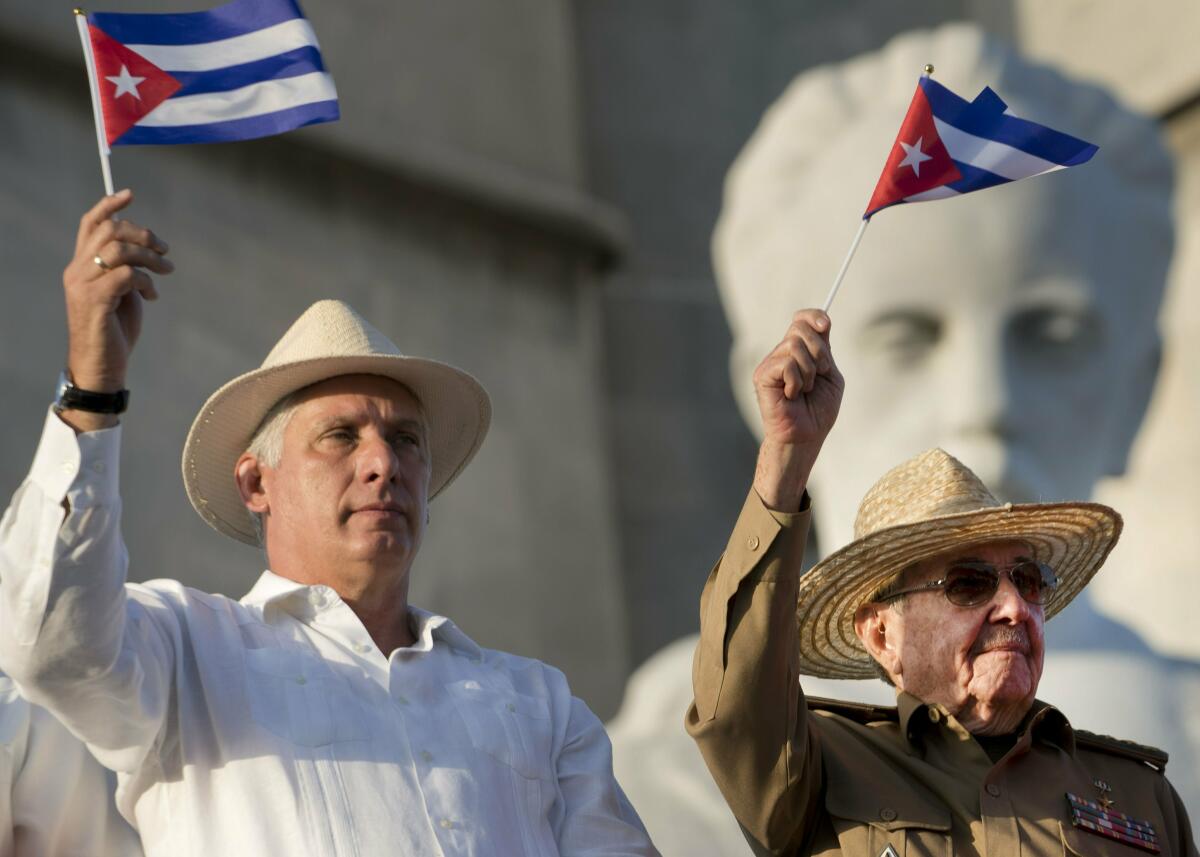‘He’s no Fidel.’ Public shaming of Cuba’s leader is a new thing in post-Castro Cuba

- Share via
Along with impassioned cries of “Freedom!” and “We are not afraid!,” a curious protest chant has echoed through the streets of Cuba the past few weeks.
In several online videos, someone shouts, “Díaz-Canel,” referring to Miguel Díaz-Canel, Cuba’s president and first secretary of the all-powerful Communist Party. The crowd then spits out a toxic slur.
The meaning of the word, like the mélange of protester demands, covers a lot of ground that is not easily translatable. But think of the most vulgar and insulting words in English, then roll them into a single, two-syllable put-down. Then think of it being repeated countless times in Cuban streets, presented in streaming videos shown around the world, and printed on signs and T-shirts now being sold widely, including on Amazon.
The poisonous epithet crystallizes the frustration and deep anger of many Cubans during this torrid summer when the COVID-19 pandemic is sickening and killing record numbers. Long lines for food, prolonged blackouts, and empty pharmacy shelves have left Cubans hungry, tired and lacking confidence in their president.
Cubans are not used to this kind of mass public shaming of their leaders. Living so long with repressive state security that made dissent risky, they learned to express their dissatisfaction quietly, usually in their own homes. Even then, they rarely mentioned their maximum leader, Fidel Castro, by name. Simply stroking one’s chin to indicate his iconic beard was sufficient.
In more than half a century leading Cuba, Fidel could not be mocked, even indirectly. In 2014, the Cuban graffiti artist called El Sexto put on a performance art piece in which he intended to release two pigs in Havana’s Central Park and allow anyone who caught the animals to keep, and eat, them — a gesture mocking the extended food shortages that prevailed even then.
But before the artist could free the pigs, he was arrested and accused of “disrespecting national figures.”
His crime? He had painted the name Fidel on one pig and Raúl on the other. El Sexto spent 10 months in jail. The message to other Cubans was clear: Don’t mess with Castro.
At 61, Díaz-Canel is much younger than the herd of warhorses who run much of the country. A former leader of the Young Communists League, he is a loyal post-revolution bureaucrat who rose steadily through the ranks under the Castros’ tutelage. Since being hand-picked by Raúl Castro to take over as president in 2018, he has been intent on emulating Fidel’s authoritarianism. His administration has severely restricted the freedom of artists and musicians, and he so handcuffed Cuba’s fledgling private businesses that thousands of Cubans gave back the self-employment licenses they took out only a few years ago in protest, pressuring the administration to reverse course and relax controls.
His attempt to connect with the people has been a disaster. A few days after Havana was hit by an extremely rare tornado in early 2019, he visited an especially hard-hit area of the capital and was run off by residents angered by his government’s inaction. The spontaneous protest, along with the humiliating scene of the presidential entourage speeding off, was caught on video.
I was reporting in the same neighborhood at the time, and Lili, a staunch communist I was interviewing, was sure that the video had been doctored to embarrass the president. But her 40-year-old son, Joseito, no fan of Fidel, insisted that the sight of Díaz-Canel scampering off showed his true mettle.
“He’s no Fidel,” he told me.
Immediately after the street protests on July 11, Díaz-Canel went on Cuba’s national TV and blamed delinquents, backed by the United States, for organizing the riots, without offering proof. Then, in a defiant rant, he issued “a call to combat,” and vowed that the only way the protesters would prevail would be “over our dead bodies.”
In subsequent days he softened his tone, but his government shut down parts of the internet and arrested or detained hundreds of individuals who took part in the protests. According to human rights groups, some have already been tried without legal representation and sentenced to up to a year in prison.
The government has made some meager, and in some instances tone-deaf, concessions. Despite blaming shortages on the United States’ embargo, limits on food and medicine that Cubans can bring on flights from the United States have been temporarily lifted. Rations of rice have been increased, and state-run stores are reportedly selling lobster, but at prices few can pay.
Many Cubans are anxious to see what President Biden will do since he has promised to reverse Trump administration sanctions. After the protests erupted, Biden expressed strong support for the Cuban people and called Cuba “a failed state.” So far, he has kept all of the Trump sanctions in place and has added a few more as he weighs his next step.
But what happens next in Cuba will depend less on U.S. policies than on whether the weak and unpopular Díaz-Canel is willing to make significant changes to the regime to address the legitimate complaints of his people.
Anthony DePalma, a journalist, has covered Latin America for three decades. He is the author most recently of “The Cubans: Ordinary Lives in Extraordinary Times.”
More to Read
A cure for the common opinion
Get thought-provoking perspectives with our weekly newsletter.
You may occasionally receive promotional content from the Los Angeles Times.









